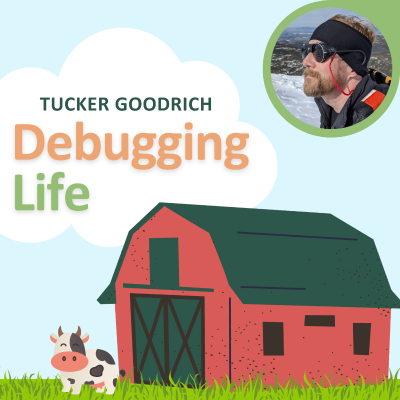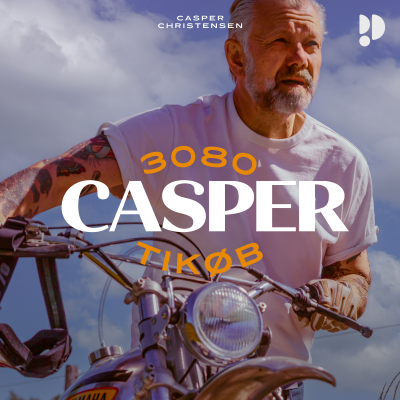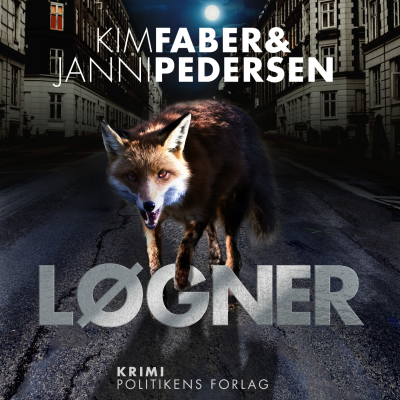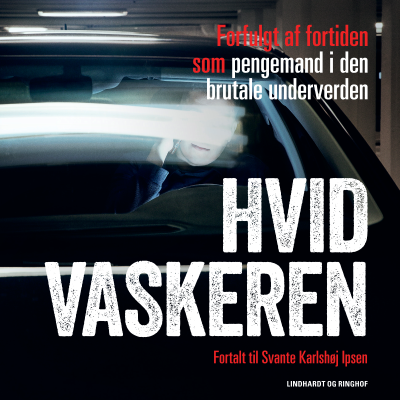
Tucker Goodrich: Debugging Life
Podcast af Tucker D. Goodrich
An exploration of healthy diet and lifestyle.
Prøv gratis i 7 dage
Efter prøveperioden kun 79,00 kr. / måned.Ingen binding.
Alle episoder
23 episoderIntroduction So apparently there is some demand for discussion/debate on the topic of seed oils and health. Dave Feldman (Ep. 9) had considered doing this at his recent conference, but couldn’t fit in the time. He’s since regained interest in the idea, and reached out to Andreas Eenfeldt and Ted Naiman, who have expressed skepticism. They replied: “We decline as we feel this debate is a distraction. The reason is that we see no good scientific evidence for replacing any source of added pure fat with another. It's not the right question.” Since there’s so much interest, and clearly that opinion is not defensible—probably why they avoided the debate!—Raphael Sirtoli volunteered to take the con side of a debate, topic: “Doctors Should Tell Patients that High Linoleic Acid Seed Oils are Unhealthy” This was a debate proposition that Raphi had suggested recently, and it had also been declined. (More about that in a future episode.) So, here we are. Please enjoy, and as always, post questions or comments in the comments below. The debate on Dave’s YouTube channel is here: https://www.youtube.com/live/JDsbpAJ28U4?si=4n7mSt56JiQDXTGN _______________________________________ Looking to fix your diet by getting rid of seed oils? Check out the Seedy app! https://www.seedyapp.com/ Tucker Goodrich Substack: https://tuckergoodrich.substack.com/ Twitter: https://twitter.com/TuckerGoodrich Youtube: https://www.youtube.com/tuckergoodrich0 Apple podcast: https://podcasts.apple.com/us/podcast/tucker-goodrich-podcast/id1617481825 Spotify podcast: https://open.spotify.com/show/7wVZ3TnRjGsa1cP2gzWY0y Podcast: https://sites.libsyn.com/408758 Blog (deprecated, but still a lot there!): http://yelling-stop.blogspot.com/ _______________________________________ Show Notes Pro Ramsden, C. E., Zamora, D., Majchrzak-Hong, S., Faurot, K. R., Broste, S. K., Frantz, R. P., Davis, J. M., Ringel, A., Suchindran, C. M., & Hibbeln, J. R. (2016). Re-Evaluation of the Traditional Diet-Heart Hypothesis: Analysis of Recovered Data from Minnesota Coronary Experiment (1968-73). BMJ, 353. https://doi.org/10.1136/bmj.i1246 Steinberg, D., Parthasarathy, S., Carew, T. E., Khoo, J. C., & Witztum, J. L. (1989). Beyond Cholesterol. Modifications of Low-Density Lipoprotein That Increase Its Atherogenicity. The New England Journal of Medicine, 320(14), 915–924. https://doi.org/10.1056/NEJM198904063201407 de Lorgeril, M., Renaud, S., Mamelle, N., Salen, P., Martin, J. L., Monjaud, I., Guidollet, J., Touboul, P., & Delaye, J. (1994). Mediterranean Alpha-Linolenic Acid-Rich Diet in Secondary Prevention of Coronary Heart Disease. Lancet (London, England), 343(8911), 1454–1459. https://doi.org/10.1016/s0140-6736(94)92580-1 Wien, M., Rajaram, S., Oda, K., & Sabaté, J. (2010). Decreasing the Linoleic Acid to α-Linolenic Acid Diet Ratio Increases Eicosapentaenoic Acid in Erythrocytes in Adults. Lipids, 45(8), 683–692. https://doi.org/10.1007/s11745-010-3430-3 Borén, J., Chapman, M. J., Krauss, R. M., Packard, C. J., Bentzon, J. F., Binder, C. J., Daemen, M. J., Demer, L. L., Hegele, R. A., Nicholls, S. J., Nordestgaard, B. G., Watts, G. F., Bruckert, E., Fazio, S., Ference, B. A., Graham, I., Horton, J. D., Landmesser, U., Laufs, U., … Ginsberg, H. N. (2020). Low-Density Lipoproteins Cause Atherosclerotic Cardiovascular Disease: Pathophysiological, Genetic, and Therapeutic Insights: A Consensus Statement from the European Atherosclerosis Society Consensus Panel. European Heart Journal, 41(24), 2313–2330. https://doi.org/10.1093/eurheartj/ehz962 Con Arris, F. A., Thai, V. T. S., Manan, W. N., & Sajab, M. S. (2020). A Revisit to the Formation and Mitigation of 3-Chloropropane-1,2-Diol in Palm Oil Production. Foods, 9(12), 1769. https://doi.org/10.3390/foods9121769 de Lorgeril, M., Renaud, S., Mamelle, N., Salen, P., Martin, J. L., Monjaud, I., Guidollet, J., Touboul, P., & Delaye, J. (1994). Mediterranean Alpha-Linolenic Acid-Rich Diet in Secondary Prevention of Coronary Heart Disease. Lancet (London, England), 343(8911), 1454–1459. https://doi.org/10.1016/s0140-6736(94)92580-1 Ramsden, C. E., Faurot, K. R., Zamora, D., Palsson, O. S., MacIntosh, B. A., Gaylord, S., Taha, A. Y., Rapoport, S. I., Hibbeln, J. R., Davis, J. M., & Mann, J. D. (2015). Targeted alterations in dietary n-3 and n-6 fatty acids improve life functioning and reduce psychological distress among patients with chronic headache: A secondary analysis of a randomized trial. Pain, 156(4), 587–596. https://doi.org/10.1097/01.j.pain.0000460348.84965.47 Ramsden, C. E., Zamora, D., Faurot, K. R., MacIntosh, B., Horowitz, M., Keyes, G. S., Yuan, Z.-X., Miller, V., Lynch, C., Honvoh, G., Park, J., Levy, R., Domenichiello, A. F., Johnston, A., Majchrzak-Hong, S., Hibbeln, J. R., Barrow, D. A., Loewke, J., Davis, J. M., … Mann, J. D. (2021). Dietary Alteration of N-3 and N-6 Fatty Acids for Headache Reduction in Adults with Migraine: Randomized Controlled Trial. BMJ, 374, n1448. https://doi.org/10.1136/bmj.n1448 Rastogi, T., Reddy, K. S., Vaz, M., Spiegelman, D., Prabhakaran, D., Willett, W. C., Stampfer, M. J., & Ascherio, A. (2004). Diet and risk of ischemic heart disease in India. The American Journal of Clinical Nutrition, 79(4), 582–592. https://doi.org/10.1093/ajcn/79.4.582 If you have any questions about sources for things discussed please ask in the comments.
Introduction I am honored to be joined by John Speakman, a leading authority on energy balance in animals, and in the use of the doubly-labeled water method of determining energy balance. This has led him into the study of obesity, among other topics, where he has become a recognized expert. Our discussion was prompted by his recent paper, “Total Daily Energy Expenditure Has Declined Over the Past Three Decades Due to Declining Basal Expenditure, Not Reduced Activity Expenditure”, which casts a new light onto the world pandemic of obesity. In addition to discussing a few of the papers that give some background to that one, and his future research plans in light of that paper, we have an enlightening discussion on the potential role of deuterium in obesity and chronic disease. Biography: “John Roger Speakman (born 1958) FRS FRSE FRSB FRSA FMedSci FRSS is a British biologist working at the University of Aberdeen, Institute of Biological and Environmental Sciences, for which he was Director from 2007 to 2011. He leads the University's Energetics Research Group, which is one of the world's leading groups using doubly labeled water (DLW) to investigate energy expenditure and balance in animals. Between 2011-2020, he was a '1000 talents' Professor at the Institute of Genetics and Developmental Biology, Chinese Academy of Sciences, in Beijing, China, where he ran the molecular energetics group. In 2020 he moved to the Shenzhen Institutes of Advanced Technology, Chinese Academy of Sciences in Shenzhen, China where he works at the Center for Energy Metabolism and Reproduction and Head of the Shenzhen Key laboratory of Metabolic Health.” https://en.wikipedia.org/wiki/John_Speakman [https://en.wikipedia.org/wiki/John_Speakman] _______________________________________ Looking to fix your diet by getting rid of seed oils? Check out the Seedy app! https://www.seedyapp.com/ [https://www.seedyapp.com/] Tucker Goodrich Substack: https://tuckergoodrich.substack.com/ [https://tuckergoodrich.substack.com/] Twitter: https://twitter.com/TuckerGoodrich [https://twitter.com/TuckerGoodrich] Youtube: https://www.youtube.com/tuckergoodrich0 [https://www.youtube.com/tuckergoodrich0] Apple podcast: https://podcasts.apple.com/us/podcast/tucker-goodrich-podcast/id1617481825 [https://podcasts.apple.com/us/podcast/tucker-goodrich-podcast/id1617481825] Spotify podcast: https://open.spotify.com/show/7wVZ3TnRjGsa1cP2gzWY0y [https://open.spotify.com/show/7wVZ3TnRjGsa1cP2gzWY0y] Podcast: https://sites.libsyn.com/408758 [https://sites.libsyn.com/408758] Blog (deprecated, but still a lot there!): http://yelling-stop.blogspot.com/ [http://yelling-stop.blogspot.com/] _______________________________________ Show Notes Hu, S., Wang, L., Yang, D., Li, L., Togo, J., Wu, Y., Liu, Q., Li, B., Li, M., Wang, G., Zhang, X., Niu, C., Li, J., Xu, Y., Couper, E., Whittington-Davies, A., Mazidi, M., Luo, L., Wang, S., … Speakman, J. R. (2018). Dietary Fat, but Not Protein or Carbohydrate, Regulates Energy Intake and Causes Adiposity in Mice. Cell Metabolism, 28(3), 415-431.e4. https://doi.org/10.1016/j.cmet.2018.06.010 [https://doi.org/10.1016/j.cmet.2018.06.010] Wu, Y., Li, B., Li, L., Mitchell, S. E., Green, C. L., D’Agostino, G., Wang, G., Wang, L., Li, M., Li, J., Niu, C., Jin, Z., Wang, A., Zheng, Y., Douglas, A., & Speakman, J. R. (2021). Very-Low-Protein Diets Lead to Reduced Food Intake and Weight Loss, Linked to Inhibition of Hypothalamic Mtor Signaling, in Mice. Cell Metabolism, 33(6), 1264–1266. https://doi.org/10.1016/j.cmet.2021.04.016 [https://doi.org/10.1016/j.cmet.2021.04.016] McNay, D. E. G., & Speakman, J. R. (2013). High Fat Diet Causes Rebound Weight Gain. Molecular Metabolism, 2(2), 103–108. https://doi.org/10.1016/j.molmet.2012.10.003 [https://doi.org/10.1016/j.molmet.2012.10.003] Speakman, J. R., De Jong, J. M. A., Sinha, S., Westerterp, K. R., Yamada, Y., Sagayama, H., Ainslie, P. N., Anderson, L. J., Arab, L., Bedu-Addo, K., Blanc, S., Bonomi, A. G., Bovet, P., Brage, S., Buchowski, M. S., Butte, N. F., Camps, S. G. J. A., Cooper, J. A., Cooper, R., … Wong, W. W. (2023). Total Daily Energy Expenditure Has Declined Over the Past Three Decades Due to Declining Basal Expenditure, Not Reduced Activity Expenditure. Nature Metabolism, 5(4), 579–588. https://doi.org/10.1038/s42255-023-00782-2 [https://doi.org/10.1038/s42255-023-00782-2] Gurven, M., Kraft, T. S., Alami, S., Adrian, J. C., Linares, E. C., Cummings, D., Rodriguez, D. E., Hooper, P. L., Jaeggi, A. V., Gutierrez, R. Q., Suarez, I. M., Seabright, E., Kaplan, H., Stieglitz, J., & Trumble, B. (n.d.). Rapidly Declining Body Temperature in a Tropical Human Population. Science Advances, 6(44), eabc6599. https://doi.org/10.1126/sciadv.abc6599 [https://doi.org/10.1126/sciadv.abc6599] Protsiv, M., Ley, C., Lankester, J., Hastie, T., & Parsonnet, J. (2020). Decreasing Human Body Temperature in the United States Since the Industrial Revolution. eLife, 9, e49555. https://doi.org/10.7554/eLife.49555 [https://doi.org/10.7554/eLife.49555] Linares, C., & Su, D. (2005). Body Mass Index and Health Among Union Army Veterans: 1891–1905. Economics & Human Biology, 3(3), 367–387. https://doi.org/10.1016/j.ehb.2005.06.002 [https://doi.org/10.1016/j.ehb.2005.06.002] Sørensen, T. I. A., Martinez, A. R., & Jørgensen, T. S. H. (2022). Epidemiology of Obesity. In J. Eckel & K. Clément (Eds.), From Obesity to Diabetes (pp. 3–27). Springer International Publishing. https://doi.org/10.1007/164_2022_581 [https://doi.org/10.1007/164_2022_581] Schramm, S., Sørensen, T. I. A., Davidsen, M., & Tolstrup, J. S. (2023). Changes in Adult Obesity Prevalence in Denmark, 1987–2021: Age–Period–Cohort Analysis of Nationally Representative Data. European Journal of Public Health, 33(3), 463–467. https://doi.org/10.1093/eurpub/ckad024 [https://doi.org/10.1093/eurpub/ckad024] Haggerty, C., Hoggard, N., Brown, D. S., Clapham, J. C., & Speakman, J. R. (2008). Intra-Specific Variation in Resting Metabolic Rate in Mf1 Mice Is Not Associated with Membrane Lipid Desaturation in the Liver. Mechanisms of Ageing and Development, 129(3), 129–137. https://doi.org/10.1016/j.mad.2007.11.001 [https://doi.org/10.1016/j.mad.2007.11.001] Zhang, L.-N., Gamo, Y., Sinclair, R., Mitchell, S. E., Morgan, D. G., Clapham, J. C., & Speakman, J. R. (2012). Effects of Chronic Oral Rimonabant Administration on Energy Budgets of Diet-Induced Obese C57BL/6 Mice. Obesity, 20(5), 954–962. https://doi.org/10.1038/oby.2011.357 [https://doi.org/10.1038/oby.2011.357] “There were four suicides in the rimonabant group (0·07%) and one in the placebo group (0·02%). The number of deaths for bariatric surgery, a widely used alternative treatment for severe obesity, would have been expected to be far greater, and in centres of excellence has been reported to be 0·3% at 90 days.2” Topol, E. J., Bousser, M.-G., Fox, K. A., & Montelescot, G. (2010). Termination of the CRESCENDO trial – Authors’ reply. The Lancet, 376(9757), 1984–1985. https://doi.org/10.1016/S0140-6736(10)62256-8 [https://doi.org/10.1016/S0140-6736(10)62256-8] Else, P. L., & Hulbert, A. J. (1987). Evolution of Mammalian Endothermic Metabolism: “Leaky” Membranes as a Source of Heat. American Journal of Physiology-Regulatory, Integrative and Comparative Physiology, 253(1), R1–R7. https://doi.org/10.1152/ajpregu.1987.253.1.R1 [https://doi.org/10.1152/ajpregu.1987.253.1.R1] Speakman, J. R., Sørensen, T. I. A., Hall, K. D., & Allison, D. B. (2023). Unanswered Questions About the Causes of Obesity. Science, 381(6661), 944–946. https://doi.org/10.1126/science.adg2718 [https://doi.org/10.1126/science.adg2718] Deuterium Boros, L., Collins, Q., & Somlyai, G. (2018, September 24). Deuterium and Metabolic Water Matter – What This Means Biochemically and Clinically. https://www.science.org/doi/10.1126/sciadv.aat7314#elettersSection [https://www.science.org/doi/10.1126/sciadv.aat7314#elettersSection] If you have any questions about sources for things discussed please ask in the comments.
Introduction Cancer is the second-leading killer of Americans, and is increasing both around the world and increasingly affecting younger and younger people. It’s obviously important to understand what environmental factors might affect our susceptibility to the various cancers. Here we discuss what I think is a key paper showing a link between our environment, genetic mutation, and metabolic dysfunction in cancer cells. “The Major Lipid Peroxidation Product, Trans- 4-Hydroxy-2-Nonenal, Preferentially Forms DNA Adducts at Codon 249 of Human P53 Gene, a Unique Mutational Hotspot in Hepatocellular Carcinoma” (Hu et al., 2002) Guest info Matt Quinn https://twitter.com/Mqsley [https://twitter.com/Mqsley] https://www.mquinn.online/ [https://www.mquinn.online/] Biography: TL;DR Here's what I am working on: I run Rebel - a fund that buys distressed SAAS and turns it around - if you want to support share our apps here I'm in the very early stages of building/buying a regenerative farm. Our food system is beyond broken. Our healthcare system doesn't heal people. If you're interested in the thoughts behind this read this I've built companies, bought companies and burned companies - if you're looking for pro bono advice or mentoring - tweet/DM me here In my day job I run a product consulting team at Tanzu Labs - if you have deep pockets and need a team to teach you how to build great software that users love - connect with me here I have failed at so so so many things - read about them here https://www.mquinn.online/ [https://www.mquinn.online/] _______________________________________ Co-host Dr. Brian Kerley https://www.seedoilrebellion.com/ [https://www.seedoilrebellion.com/] https://twitter.com/SeedOilDsrspctr [https://twitter.com/SeedOilDsrspctr] Looking to fix your diet by getting rid of seed oils? Check out the Seedy app! https://www.seedyapp.com/ [https://www.seedyapp.com/] Tucker Goodrich Substack: https://tuckergoodrich.substack.com/ [https://tuckergoodrich.substack.com/] Twitter: https://twitter.com/TuckerGoodrich [https://twitter.com/TuckerGoodrich] Youtube: https://www.youtube.com/tuckergoodrich0 [https://www.youtube.com/tuckergoodrich0] Apple podcast: https://podcasts.apple.com/us/podcast/tucker-goodrich-podcast/id1617481825 [https://podcasts.apple.com/us/podcast/tucker-goodrich-podcast/id1617481825] Spotify podcast: https://open.spotify.com/show/7wVZ3TnRjGsa1cP2gzWY0y [https://open.spotify.com/show/7wVZ3TnRjGsa1cP2gzWY0y] Podcast: https://sites.libsyn.com/408758 [https://sites.libsyn.com/408758] Blog (deprecated, but still a lot there!): http://yelling-stop.blogspot.com/ [http://yelling-stop.blogspot.com/] _______________________________________ Show Notes Hu, W., Feng, Z., Eveleigh, J., Iyer, G., Pan, J., Amin, S., Chung, F.-L., & Tang, M. (2002). The Major Lipid Peroxidation Product, Trans- 4-Hydroxy-2-Nonenal, Preferentially Forms DNA Adducts at Codon 249 of Human P53 Gene, a Unique Mutational Hotspot in Hepatocellular Carcinoma. Carcinogenesis, 23(11), 1781–1789. https://doi.org/10.1093/carcin/23.11.1781 [https://doi.org/10.1093/carcin/23.11.1781] Ravenous: Otto Warburg, the Nazis, and the Search for the Cancer-Diet Connection https://amzn.to/3Unn39b [https://amzn.to/3Unn39b] Cancer as a Metabolic Disease: On the Origin, Management, and Prevention of Cancer https://amzn.to/44pbz9C [https://amzn.to/44pbz9C] Goodrich, T. D. (2021, July 8). Interview: Thomas Seyfried on Glioblastoma, Metabolic Cancer Breakthroughs, with David Gornoski on A Neighbor’s Choice [Blog]. Yelling Stop. https://yelling-stop.blogspot.com/2021/07/podcast-interview-thomas-seyfried-with.html [https://yelling-stop.blogspot.com/2021/07/podcast-interview-thomas-seyfried-with.html] Soussi, T. (2000). The P53 Tumor Suppressor Gene: From Molecular Biology to Clinical Investigation. Annals of the New York Academy of Sciences, 910, 121–137; discussion 137-139. https://doi.org/10.1111/j.1749-6632.2000.tb06705.x [https://doi.org/10.1111/j.1749-6632.2000.tb06705.x] Matoba, S., Kang, J.-G., Patino, W. D., Wragg, A., Boehm, M., Gavrilova, O., Hurley, P. J., Bunz, F., & Hwang, P. M. (2006). P53 Regulates Mitochondrial Respiration. Science, 312(5780), 1650–1653. https://doi.org/10.1126/science.1126863 [https://doi.org/10.1126/science.1126863] The American Oil Chemists’ Society. (2004, June). Wilhelm Normann (1870-1939). INFORM Magazine. https://lipidlibrary.aocs.org/resource-material/the-history-of-lipid-science-and-technology/wilhelm-normann-(1870-1939) [https://lipidlibrary.aocs.org/resource-material/the-history-of-lipid-science-and-technology/wilhelm-normann-(1870-1939)] Goodrich, T. D. (2016, January 14). Thyroid and Low-Carb: What Do Thyroid Hormones Do? [Blog]. Yelling Stop. https://open.substack.com/pub/tuckergoodrich/p/thyroid-and-low-carb-what-do-thyroid [https://open.substack.com/pub/tuckergoodrich/p/thyroid-and-low-carb-what-do-thyroid] If you have any questions about sources for things discussed please ask in the comments.
Introduction What about fish oil? Is it a problem due to oxidation and contamination? Is it beneficial to health as many claim or is it a PUFA that’s bad for your health? Jacob recently published an analysis of various fish oils with the team at Consumer Labs, looking at oxidative toxicity and purity of a wide variety of commercially available fish oils. We discuss omega-3 and health, fish oils and oxidation, the science of seed oils and health, and, as a bonus, the problem with chocolates. This is definitely a bit of a geek fest, so let me know if you have any questions. Guest info Jacob Hands, MD candidate and consultant for Consumer Lab on quality control and testing of supplements, and consultant to Rhonda Patrick, MD, of Found my Fitness. Consumer Lab https://www.consumerlab.com/ [https://www.consumerlab.com/] Found my Fitness https://www.foundmyfitness.com/ [https://www.foundmyfitness.com/] Biography: “Medical student passionate about patient care, research, and emerging therapeutics. “M.D. Candidate at The George Washington University School of Medicine and Health Sciences.” https://www.linkedin.com/in/jacob-hands-3622619b/ [https://www.linkedin.com/in/jacob-hands-3622619b/] _______________________________________ Looking to fix your diet by getting rid of seed oils? Check out the Seedy app! https://www.seedyapp.com/ [https://www.seedyapp.com/] Tucker Goodrich Substack: https://tuckergoodrich.substack.com/ [https://tuckergoodrich.substack.com/] Twitter: https://twitter.com/TuckerGoodrich [https://twitter.com/TuckerGoodrich] Youtube: https://www.youtube.com/tuckergoodrich0 [https://www.youtube.com/tuckergoodrich0] Apple podcast: https://podcasts.apple.com/us/podcast/tucker-goodrich-podcast/id1617481825 [https://podcasts.apple.com/us/podcast/tucker-goodrich-podcast/id1617481825] Spotify podcast: https://open.spotify.com/show/7wVZ3TnRjGsa1cP2gzWY0y [https://open.spotify.com/show/7wVZ3TnRjGsa1cP2gzWY0y] Podcast: https://sites.libsyn.com/408758 [https://sites.libsyn.com/408758] Blog (deprecated, but still a lot there!): http://yelling-stop.blogspot.com/ [http://yelling-stop.blogspot.com/] _______________________________________ Show Notes Hands, J. M., Anderson, M. L., Cooperman, T., & Frame, L. A. (2023). A Multi-Year Rancidity Analysis of 72 Marine and Microalgal Oil Omega-3 Supplements. Journal of Dietary Supplements, 0(0), 1–12. https://doi.org/10.1080/19390211.2023.2252064 [https://doi.org/10.1080/19390211.2023.2252064] This is the only human study I’m aware of showing harm from eating marine foods. The Japanese and the Eskimos do not suffer from infertility, so I think this gentleman must have been doing something wrong. “I lived for 100 days on nothing but marine animal food (seal, fish, crustaceans and molluscs) and water; weights of all food were recorded….” “In seminal fluid, the total amount of prostaglandins decreased significantly and small amounts of the [Ω-]3-series appeared; spermatozoa became immobile and then disappeared.” Sinclair, H. M. (1981). The Relative Importance of Essential Fatty Acids of the Linoleic and Linolenic Families: Studies with an Eskimo Diet. Progress in Lipid Research, 20, 897–899. https://doi.org/10.1016/0163-7827(81)90167-3 [https://doi.org/10.1016/0163-7827(81)90167-3] Goodrich, T. D. (2022, April 13). The Folate Experiment [Blog]. Yelling Stop. https://open.substack.com/pub/tuckergoodrich/p/the-folate-experiment [https://open.substack.com/pub/tuckergoodrich/p/the-folate-experiment] Goodrich, T. (2021, October 19). What Is The Most Fattening Food? [Blog]. Yelling Stop. https://tuckergoodrich.substack.com/p/what-is-the-most-fattening-food [https://tuckergoodrich.substack.com/p/what-is-the-most-fattening-food] Mozaffarian, D., Hao, T., Rimm, E. B., Willett, W. C., & Hu, F. B. (2011). Changes in Diet and Lifestyle and Long-Term Weight Gain in Women and Men. New England Journal of Medicine, 364(25), 2392–2404. https://doi.org/10.1056/NEJMoa1014296 [https://doi.org/10.1056/NEJMoa1014296] Zong, G., Liu, G., Willett, W. C., Wanders, A. J., Alssema, M., Zock, P. L., Hu, F. B., & Sun, Q. (2019). Associations Between Linoleic Acid Intake and Incident Type 2 Diabetes Among U.S. Men and Women. Diabetes Care, 42(8), 1406–1413. https://doi.org/10.2337/dc19-0412 [https://doi.org/10.2337/dc19-0412] Johns, D. M. (2023, April 13). Nutrition Science’s Most Preposterous Result: Could Ice Cream Possibly Be Good for You? The Atlantic, 5/2023. https://www.theatlantic.com/magazine/archive/2023/05/ice-cream-bad-for-you-health-study/673487/ [https://www.theatlantic.com/magazine/archive/2023/05/ice-cream-bad-for-you-health-study/673487/] Pearce, N. (2011). Epidemiology in a Changing World: Variation, Causation and Ubiquitous Risk Factors. International Journal of Epidemiology, 40(2), 503–512. https://doi.org/10.1093/ije/dyq257 [https://doi.org/10.1093/ije/dyq257] Huang, Z., Sun, S., Lee, M., Maslov, A. Y., Shi, M., Waldman, S., Marsh, A., Siddiqui, T., Dong, X., Peter, Y., Sadoughi, A., Shah, C., Ye, K., Spivack, S. D., & Vijg, J. (2022). Single-Cell Analysis of Somatic Mutations in Human Bronchial Epithelial Cells in Relation to Aging and Smoking. Nature Genetics, 54(4), Article 4. https://doi.org/10.1038/s41588-022-01035-w [https://doi.org/10.1038/s41588-022-01035-w] Jacob’s Discussion Notes Topics to cover 1. Omega-3 paper – a. Overall, our results revealed that 68% (23/34) of flavored and 13% (5/38) unflavored consumer Ω3 supplements exceeded the TOTOX upper limit set by the Global Organization for EPA and DHA (GOED) voluntary monograph standard of ≤ 26, with 65% (22/34) flavored supplements and 32% (12/38) unflavored supplements failing the PV upper limit of ≤ 5 and 62% (21/34) flavored supplements exceeding the p-AV upper limit of ≤ 20. i. What’s important is that peroxide was still significantly different in those with added versus non added extracts (0.04) almost double the PV b. How does fish oil metabolize? i. Peroxides, then aldehydes (Ω-3HHE & Ω-6 HNE, etc.) ii. Why do I think it probably doesn't matter? 1. 2 big studies – in the first study, after seven weeks of supplementation with 8 grams of oil per day, the authors found no signs of oxidative stress in any of the groups after looking at nine different measures (4-HHE, 4-HNE, 8-iso-prostaglandin F2α, alpha-tocopherol, total glutathione, glutathione reductase, glutathione peroxidase, catalase, and C-Reactive Protein) of oxidative stress in the blood and urine 4. This study demonstrated that high dosages of highly oxidized fish oil do not induce oxidative stress in our bodies.” 2. “The second study was conducted by the same group and used the same study design, but looked at four additional markers of oxidative stress related to vascular inflammation (intercellular adhesion molecule 2 (sICAM-2), soluble vascular adhesion molecule 1 (sVCAM-1), interleukin 6 (IL-6) and oxidized LDL cholesterol) 5. Again, no impact on these markers was found with consumption of abnormally oxidized fish oil.” BUT 3. point to consider is that may have adverse effects on lipids https://www.cambridge.org/core/journals/british-journal-of-nutrition/article/oxidised-fish-oil-does-not-influence-established-markers-of-oxidative-stress-in-healthy-human-subjects-a-randomised-controlled-trial/32EB4869D3012F6E44FD23A7D25D7F7E [https://www.cambridge.org/core/journals/british-journal-of-nutrition/article/oxidised-fish-oil-does-not-influence-established-markers-of-oxidative-stress-in-healthy-human-subjects-a-randomised-controlled-trial/32EB4869D3012F6E44FD23A7D25D7F7E] Would want to point out that ICAM and VCAM does 2. How should I think more generally about oxidized oils? a. First of all, let’s go over fats and how that works – note that we don't have 15 desaturase which would convert 06 to 03 – what’s going to be the broad point? Each 06 and 03 come with anti-inflammatory elements, one is just less inflamm i. Notice that AA derived eicosanoids products such as lipoxins actually follow https://www.ncbi.nlm.nih.gov/pmc/articles/PMC164223/ [https://www.ncbi.nlm.nih.gov/pmc/articles/PMC164223/] b. Something sympathetic for you – Nicolantino et al. argue 06 is a driver because oxidation products of LA are high in atheromas https://openheart.bmj.com/content/5/2/e000898 – why is this not replicated in most of the systematic analysis? i. https://www.ncbi.nlm.nih.gov/pmc/articles/PMC8924827/#:~:text=Indeed%2C%20an%20inverse%20relationship%20between,CHD [https://www.ncbi.nlm.nih.gov/pmc/articles/PMC8924827/#:~:text=Indeed%2C%20an%20inverse%20relationship%20between,CHD])%20risk%20%5B9%5D. (granted this FBG and other markers of coronary disease increase etc) ii. https://www.ncbi.nlm.nih.gov/pmc/articles/PMC6029721/ [https://www.ncbi.nlm.nih.gov/pmc/articles/PMC6029721/] (more linolenic = less diabetes) iii. https://www.bmj.com/content/366/bmj.l4697 [https://www.bmj.com/content/366/bmj.l4697] iv. https://www.tandfonline.com/doi/abs/10.1080/10408398.2022.2056867 [https://www.tandfonline.com/doi/abs/10.1080/10408398.2022.2056867] (linear LA = less CHD) v. More LA less CVD https://www.ncbi.nlm.nih.gov/pmc/articles/PMC4334131/ vi. LA inverse AA positively associated with diabetes https://www.sciencedirect.com/science/article/abs/pii/S026156142030008X vii. Cochrane style review unclear https://pubmed.ncbi.nlm.nih.gov/24723079/ viii. Cancer risk? Minimal except maybe prostate cancer https://www.nature.com/articles/s41416-020-0761-6 [https://www.nature.com/articles/s41416-020-0761-6] c. More to the point, there is no evidence that even giving straight ARA still unclear up to 1 gram https://www.cambridge.org/core/journals/british-journal-of-nutrition/article/systematic-review-of-the-effects-of-increasing-arachidonic-acid-intake-on-pufa-status-metabolism-and-healthrelated-outcomes-in-humans/6A0167CBF8EC148B4855C25D002E4AC4 1. Even if metabolized, the oxidative derivatives can do cool things i. would other oils increase oxidative stress? Maybe https://iopscience.iop.org/article/10.1088/1755-1315/217/1/012055 [https://iopscience.iop.org/article/10.1088/1755-1315/217/1/012055] (source) https://lpi.oregonstate.edu/mic/other-nutrients/essential-fatty-acids [https://lpi.oregonstate.edu/mic/other-nutrients/essential-fatty-acids] d. Is the body made to deal with oxidative stress? i. What is the evidence that the mouse model is valid? Note Scandinavian SNPs associated with rancid consumption ii. Changes in MDA are unpredictable and highly oxidized meals can generate low MDA etc not easy to say that iii. Omega 3 attenuates effects of oxidation and increases parameters of oxidative stability https://pubmed.ncbi.nlm.nih.gov/31563611/ [https://pubmed.ncbi.nlm.nih.gov/31563611/] 2. Chocolate a. Cadmium is toxic lol but here it data on recruiting pro-inflammatory macrophages in artery https://pubmed.ncbi.nlm.nih.gov/27156912/ [https://pubmed.ncbi.nlm.nih.gov/27156912/] b. Lead also bad for various reasons c. Lets go over levels, why prop 65 exists versus what an IRL is and 2.2 8.8 mcg/day means in any context If you have any questions about sources for things discussed please ask in the comments.
Diabetes, broadly defined, afflicts greater than 50% of the U.S. population. The hallmark of type 2 diabetes is insulin resistance. While many are unable to answer the question of why a formerly rare disease now afflicts the majority of the population, we go over research dating back to 1964 that makes it clear that we have a pretty good idea of what causes insulin resistance. Scientists can easily induce insulin resistance in humans. How do they do it, and what might it tell us about what has caused our epidemic of diabetes? Guest info Matt Quinn https://twitter.com/Mqsley [https://twitter.com/Mqsley] https://www.mquinn.online/ [https://www.mquinn.online/] Biography: TL;DR Here's what I am working on: I run Rebel - a fund that buys distressed SAAS and turns it around - if you want to support share our apps here I'm in the very early stages of building/buying a regenerative farm. Our food system is beyond broken. Our healthcare system doesn't heal people. If you're interested in the thoughts behind this read this I've built companies, bought companies and burned companies - if you're looking for pro bono advice or mentoring - tweet/DM me here In my day job I run a product consulting team at Tanzu Labs - if you have deep pockets and need a team to teach you how to build great software that users love - connect with me here I have failed at so so so many things - read about them here https://www.mquinn.online/ [https://www.mquinn.online/] _______________________________________ Co-host Dr. Brian Kerley https://www.seedoilrebellion.com/ [https://www.seedoilrebellion.com/] https://twitter.com/SeedOilDsrspctr [https://twitter.com/SeedOilDsrspctr] Looking to fix your diet by getting rid of seed oils? Check out the Seedy app! https://www.seedyapp.com/ [https://www.seedyapp.com/] Tucker Goodrich Substack: https://tuckergoodrich.substack.com/ [https://tuckergoodrich.substack.com/] Twitter: https://twitter.com/TuckerGoodrich [https://twitter.com/TuckerGoodrich] Youtube: https://www.youtube.com/tuckergoodrich0 [https://www.youtube.com/tuckergoodrich0] Apple podcast: https://podcasts.apple.com/us/podcast/tucker-goodrich-podcast/id1617481825 [https://podcasts.apple.com/us/podcast/tucker-goodrich-podcast/id1617481825] Spotify podcast: https://open.spotify.com/show/7wVZ3TnRjGsa1cP2gzWY0y [https://open.spotify.com/show/7wVZ3TnRjGsa1cP2gzWY0y] Podcast: https://sites.libsyn.com/408758 [https://sites.libsyn.com/408758] Blog (deprecated, but still a lot there!): http://yelling-stop.blogspot.com/ [http://yelling-stop.blogspot.com/] _______________________________________ Show Notes Felber, J. P., & Vannotti, A. (1964). Effects of Fat Infusion on Glucose Tolerance and Insulin Plasma Levels. Medicina Experimentalis: International Journal of Experimental Medicine, 10, 153–156. https://doi.org/10.1159/000135410 [https://doi.org/10.1159/000135410] Nowotny, B., Zahiragic, L., Krog, D., Nowotny, P. J., Herder, C., Carstensen, M., Yoshimura, T., Szendroedi, J., Phielix, E., Schadewaldt, P., Schloot, N. C., Shulman, G. I., & Roden, M. (2013). Mechanisms Underlying the Onset of Oral Lipid–Induced Skeletal Muscle Insulin Resistance in Humans. Diabetes, 62(7), 2240–2248. https://doi.org/10.2337/db12-1179 Attia, P. (2020, December 7). #140 - Gerald Shulman, M.D., Ph.D.: A masterclass on insulin resistance—molecular mechanisms and clinical implications (140) [Mp3]. https://peterattiamd.com/geraldshulman/ [https://peterattiamd.com/geraldshulman/] Koch, S., Cohen, D., & Carroll, L.. (2013, June 7). Drug treatment Omegaven that could save infants’ lives not yet approved by FDA [Mp4]. In NBC News. NBC. http://www.nbcnews.com/nightly-news/drug-treatment-omegaven-could-save-infants-lives-not-yet-approved-flna6C10249250 [http://www.nbcnews.com/nightly-news/drug-treatment-omegaven-could-save-infants-lives-not-yet-approved-flna6C10249250] If you have any questions about sources for things discussed please ask in the comments.
Tilgængelig overalt
Lyt til Podimo på din telefon, tablet, computer eller i bilen!
Et univers af underholdning på lyd
Tusindvis af lydbøger og eksklusive podcasts
Ingen reklamer
Spild ikke tiden på at lytte til reklamepauser, når du lytter til Podimos indhold.
Prøv gratis i 7 dage
Efter prøveperioden kun 79,00 kr. / måned.Ingen binding.
Eksklusive podcasts
Uden reklamer
Gratis podcasts
Lydbøger
20 timers / måned



















